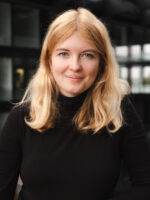“Journalism shouldn’t be gatekept”: An interview with Antonia Franz, Süddeutsche Zeitung’s podcast journalist
Media . Politics . Uncategorized
Antonia Franz is a German journalist focusing on audio content, such as podcasts and radio. She got her journalism training at Deutsche Journalistenschule, as well as doing an exchange period in Finland at the University of Helsinki while studying politics and law in Munich. She has done multiple internships, i.e. at Bayerischer Rundfunk and Süddeutsche Zeitung, worked at the student radio station M94.5 and created video content for Süddeutsche Zeitung. Currently she’s a part of the SZ podcast team, covering subjects like politics and current societal issues. On a sunny Tuesday afternoon I got the opportunity of meeting up with her via Zoom for an interview about her career as a journalist as well as some tips for aspiring journalists.
AA: Firstly I would like to hear a little bit about M94.5: was it the beginning of your audio or radio journalism career, and if not, then what was?
AF: It was pretty much the beginning, but after school I also did an internship at a Munich radio station called Gong 96.3. That was my first experience: I did a lot of street surveys, asking people (sometimes) weird questions. Then when I went to university, I heard of M94.5. There I could do so many things: host stuff, research interesting fields, learn team coordination, write articles… I really enjoyed being at M94.5.
AA: What would you say were the biggest takeaways from your time at M94.5?
AF: I would say I learned how to think as a journalist there, as well as always to look at both sides, especially regarding politics. I could also try so many different things – it gave me a lot of confidence. M94.5 was a big influence for me getting into podcasts and radio.
AA: Next I would be very interested in hearing about your time in Helsinki. Could you tell me a little bit about that?
AF: Yes, I actually went there for an exchange for one semester. I studied politics back then, but my university allowed me to also choose other fields when going abroad, and I saw some journalism courses I thought I might try. I wanted to try out Helsinki, because I’d never been to Northern Europe before. It was really great. We for example visited the public radio station in Helsinki, and it was interesting to see how similar the problems with public media were to the ones in Munich. It was cool to study in Finland: the university was cool, there were nice buildings and nice food… I really loved that you can eat as much bread with butter as you want!
AA: Yes, it seems like Germans and Finns share a similar love for bread! Next I would like to hear about journalism more in general. What do you think it is about journalism that made you become a journalist in the first place?
AF: I feel like it’s just awesome to get money for talking to people I wouldn’t normally get to talk to, getting new perspectives and acquiring knowledge about new topics. That’s really a privilege that you have as a journalist: you can read, learn and get to know people.
AA: What are in your opinion the best and most challenging parts of being a journalist?
AF: The reason I chose this job was that you can really get to know people and dig deep into topics. You also have an impact and can “change the world” a little bit, which is really cool.
Currently I prefer working with podcasts: you can really get to know people when you actually hear them telling their stories, and then you have a cool end product [podcast] that you can show your friends. Right now I’m doing a lot of long-term stories, kind of like “Netflix series” but as podcasts.
[Regarding the challenging part] There’s a lot of cool people doing great stuff in journalism, so it’s a bit hard sometimes to focus on yourself and not compare yourself to others. Then there’s also the pressure of social comments: you have to be resilient, so that it doesn’t touch you too much when people criticize your work.
AA: Before making podcasts for SZ you worked at the video department. Do you think you’ll always be working with audio journalism? And if you weren’t a journalist, what do you think you would do?
AF: I really enjoyed being in the video department, but right now I think it’s nice that with podcasts you don’t have to worry about being on camera. Since I studied politics before, I could imagine maybe one day working for a political foundation or institute, but right now or in the near future I can’t really imagine not being a journalist.
AA: To wrap up, would you have any advice for people aspiring to become journalists one day? Would you do anything differently starting now? And what kind of qualities should a future journalist have?
AF: I would just tell people to try stuff like M94.5: when you’re a student, look into stuff like student radio stations, newspapers and magazines. Just try out everything –journalism is so many different things. It’s also important in this job to handle social media and have different perspectives. As a journalist you have to be curious and want to get to know people and listen to them, but journalism shouldn’t be gatekept. Anyone can be a journalist!